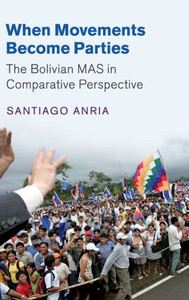Why do some parties formed by social movements develop top-down structures while others stay more open and responsive to their social bases? The first rigorous comparative study of movement-based parties, this book shows not only how movements can form parties but also how movements contribute to parties' internal politics and shape organizational party models over the long term. Although the existing literature argues that movement-based parties will succumb to professionalization and specialization, Anria shows that this is not inevitable or preordained through an in-depth examination of the unusual and counterintuitive development of Bolivia's MAS. Anria then compares the evolution of the MAS with that of other parties formed by social movements, including Brazil's PT and Uruguay's FA. In a region where successful new parties of any type have been rare, these three parties are remarkable for their success. Yet, despite their similar origins, they differ sharply in their organizational models.
- | Author: Santiago Anria
- | Publisher: Cambridge University Press
- | Publication Date: November 21, 2019
- | Number of Pages: 306 pages
- | Language: English
- | Binding: Paperback
- | ISBN-10: 1108446329
- | ISBN-13: 9781108446327
